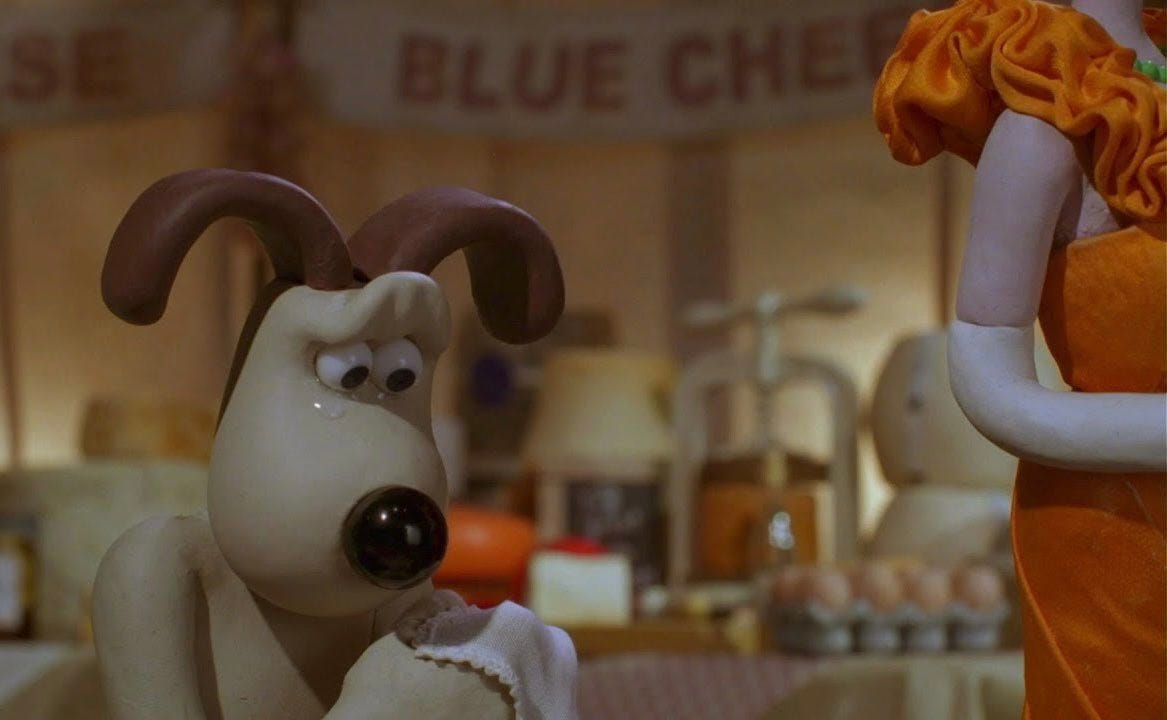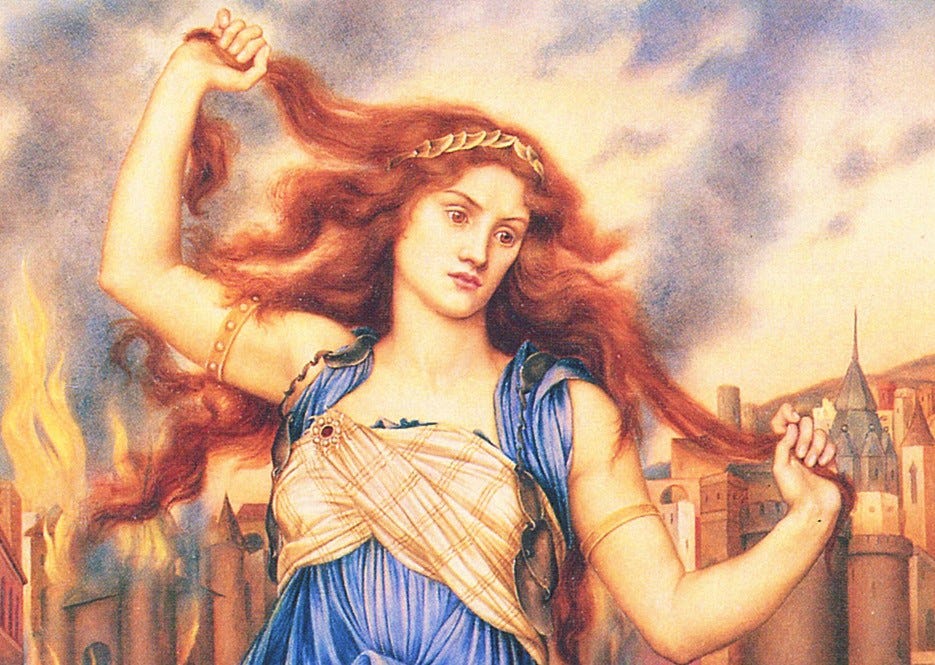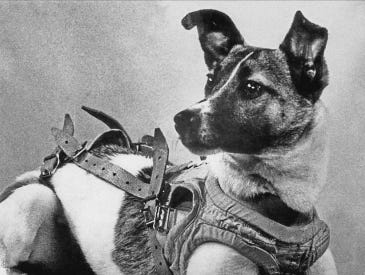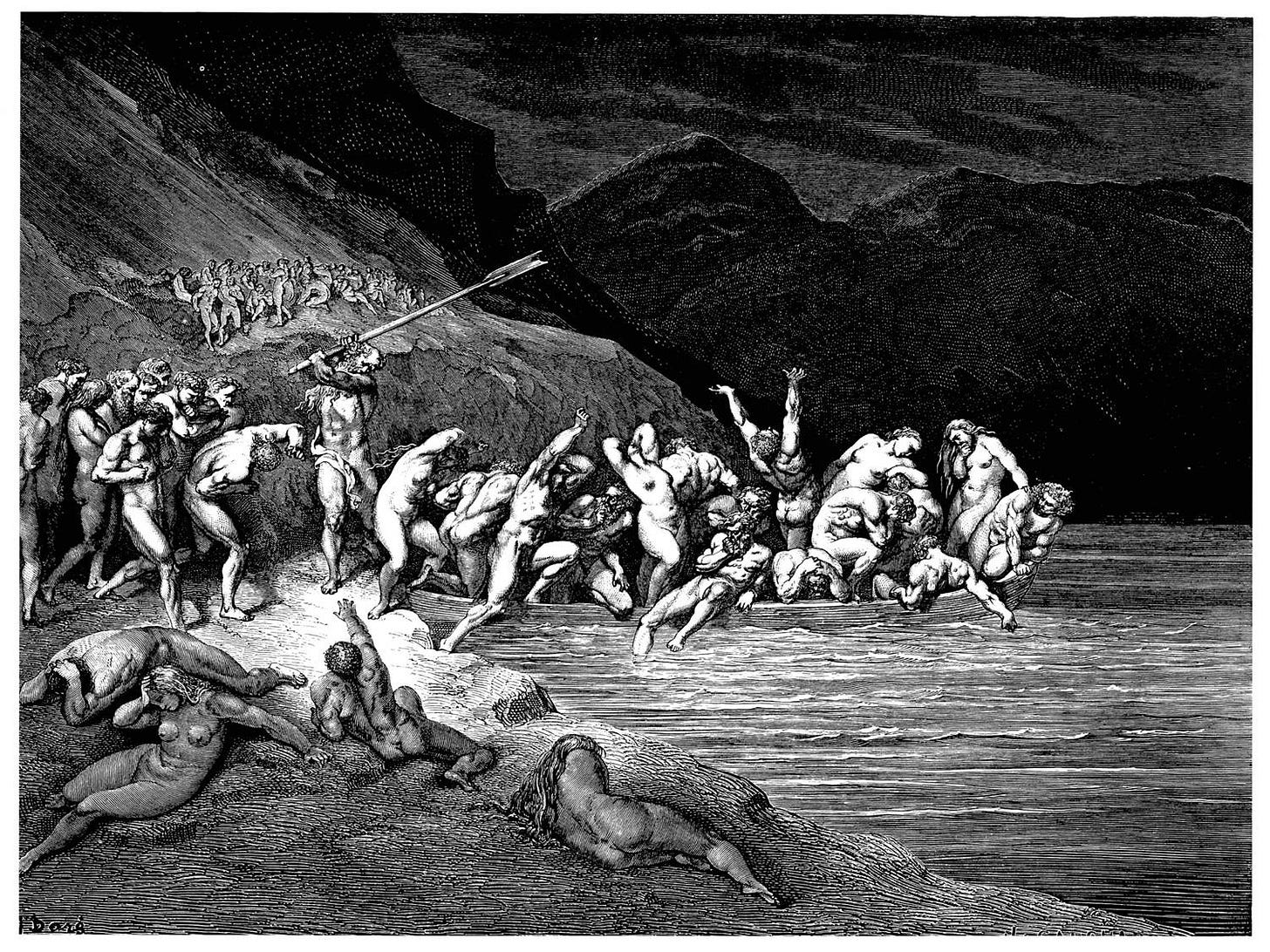On Gromit & Wallace
Here I sit, I can do no other.
I have not been given access to a preview screening of the upcoming Wallace and Gromit feature A Vengeance Most Fowl. However, I can still tell you what will happen.
Wallace will act in his own short-sighted interests. He will avoid conflict at any cost, to the detriment of his long suffering slave dog Gromit. Useful idiot Wallace will then be exploited by forces very much within his control and Gromit will in turn, for some reason, save the day. Having experienced a range of emotions that Wallace could not even consider yet alone acknowledge, Gromit will then sit down with his newspaper, and return to the way things were. Largely being offered cheese.
To live the life of Gromit is to be moulded, to be morphed, both by Wallace and his divine Creators, and, lacking a means of communication, be denied the ability to return the favour. Voiceless Gromit is a bottomless vessel of emotional tolerance. He knows he has experienced pain before, and knows he will experience it again. Often confronting the viewer directly, he is quiet sign of resistance against all that serve to shape him.
The Plight of Plasticine Gromit is one that is destined to be told and retold for years to come. Gromit, and to a lesser extent Wallace, has transcended light entertainment and entered the realm of the folk-tale, there is no doubt that he now exists as part of a contemporary mythology. The retellings have begun; Wallace’s original orator Peter Sallis is dead, and now Ben Whitehead has taken up the mantle. Implicitly, these characters are destined to live on beyond even Nick Park’s passing. We are custodians of these models and bear their weight of their stories, it is our responsibility to ensure they are told ad infinitum. We shape them, and they mould us.
Just as the Gods in epics such as The Iliad occasionally appear in physical form on the battlefield to remind their subjects who is pulling the strings, the fingerprints of Aardman employees linger as a reminder of an omniscient puppet master. However, despite playing a God-like role in the lives of Gromit and Wallace, we are no longer in control.
Greek God Apollo granted human priestess Cassandra the gift of prophecy, but upon rejecting his advances - cursed her, ensuring that Cassandra’s prophecies were forever true but never believed. We as creator have bestowed upon Gromit emotional maturity and an understanding of the human condition, he speaks the truth in all of us. Just as Cassandra's truth was destined to be spoken but never heeded by other humans, Gromit's silent wisdom is destined to be witnessed but never fully grasped by slave master Wallace. Like Apollo's gift, Gromit’s message has transcended beyond our control. Apollo, the God who could see all futures, could not change Cassandra's use of his gift; we, who can mould Gromit's form, cannot control our depiction of him. If Gromit could speak he would probably say something like:
Nick Park, Nick Park!
God of all ways, but only Death's to me,
Once and again, O thou, Destroyer named,
Thou hast destroyed me, thou, my love of old!
Given this, we often find ourselves coming to expect that Gromit will strike a more introspective tone than other figures in Gromit and Wallace. As an entity his personal mythology is more emblematic to Sisyphus and his eternal punishment of rolling a boulder up a hill as opposed to heroic Hercules triumphing over rogue bakers, or a pair of mechanical trousers piloted by a penguin.
However, in this contemporary myth of stoicism, Gromit does not play the role of Sisyphus. Gromit is the boulder. We as custodians bear the weight of bringing him into existence, we are doomed to tell the tragedy of Gromit, to raise him up, and to pull him down. Gromit and I will never summit, and we are burdened with that responsibility. In this analogy, Wallace serves as the mountain itself, static, unwavering in complacency. Wallace provides no respite for us, nor Gromit. We are doomed to force Gromit to try and try again, and yet go nowhere at all. Laika was given the tragic reward of burning up into a preconceived infinite lightness, eternal fame and glory. We rewarded Gromit’s trip into space with some cheese (which he doesn’t seem to personally enjoy that much).
“Here I sit, I can do no other” once proclaimed Gromit, or so it goes. This puritanical stoicism in the face of eternal damnation that he shows is evidence that Gromit is the main character. Gromit and Wallace. Though, we must also consider the role that Wallace plays within this myth. He is a glutton at best. Motivated by cheese, and famously in-bread. He is meek and self-serving, a pushover. Dante reserved the vestibule of hell to these people with no ambitions, good nor bad. Abandon all hope, ye who enter here. They were destined for eternal stagnation. There are those characters in the mythology that do have ulterior motives, i.e. the penguin, but Wallace is unbefitting of even a negative analysis. He is nothing. He exists purely as blank canvas on which Gromit can project both his pleasure and pain.
How can Gromit transcend beyond his invented suffering, if we have lost control of the strings? How will this folk-tale evolve? One scenario is for Gromit to be considered, in the future, to be assumed to be based on a real dog. Hopefully in that case this very blog will be lost and cease to serve as a reminder that he’s completely made up. The weight of our burden as creators and custodians would be transformed into historical documentation.
Papers will be written and debates will be held over “The Historical Gromit" - analysing evidence for his actual existence, debating the accuracy of various tellings, arguing over the true location of his home. The fingerprints in the clay would be studied not as signs of divine creation but as proof of historical authenticity. Academics would argue over whether "A Grand Day Out" represents an actual journey to a lost moon made of cheese, or is merely allegorical.
The ultimate victory over Gromit’s current metaphysical Sisyphean existence will not be in being pushed to the top of the mountain by us humans, but in future generations assuming we were never pushing a boulder at all - merely documenting a profound historical truth about a dog who carried the weight of human wisdom in silence.
There is a cruel twist to this fate. Like Wallace, we will miss the point of the tale entirely - and yet like Gromit, we now must bear this misunderstanding with stoic grace. From Gromit to Wallace.
CANIS VIVIT.






